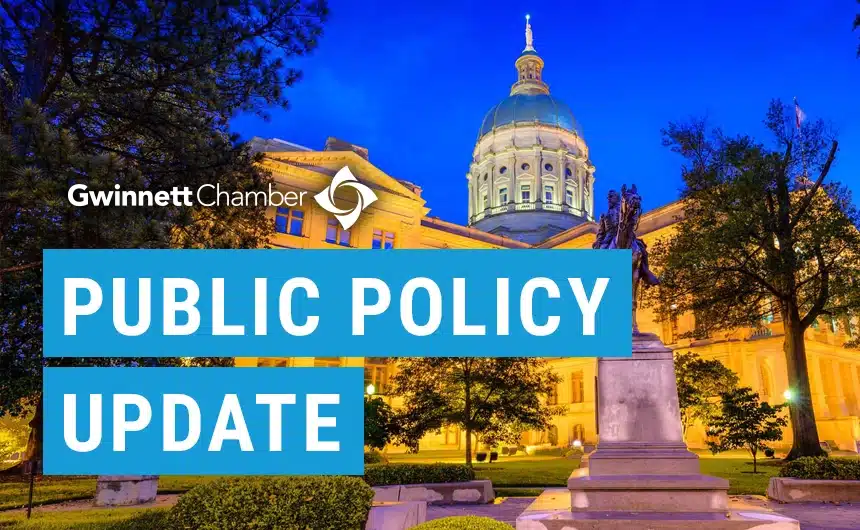The General Assembly convened this week for Legislative Days 32-35. Legislators will resume business next week for Legislative Days 36-38 with Wednesday being a committee workday. Sine Die, the last day of session, is less than two weeks away (March 29).
Budget
Governor Kemp signed the Amended Fiscal Year 23 budget (HB 18) that includes $1.1 billion in back funds to the Georgia Department of Transportation from the gas tax suspension. Georgia property owners will also receive a one-time property tax cut. The Senate is finalizing their recommendations to the FY24 budget (HB 19). The budget fully funds the K-12 QBE formula ($13.1 billion), a $2,000 pay increase for teachers and state employees, a $4,000 pay increase for law enforcement officers, and a 3% cost of living increase for state government pensioners.
Governor’s bills
HB 162, sponsored by Rep. Lauren McDonald (Governor’s Floor Leader), would provide a one-time tax credit of $250 for individuals and $500 for married couples who filed taxes in Georgia in 2021 and 2022. The House passed the measure 170-2. The Senate passed the measure on Tuesday 46-7. Governor Kemp signed the bill into law shortly after.
HB 128, sponsored by Rep. Soo Hong (Governor’s Floor Leader), would increase the representation of businesses owned by minorities, women, and veterans in the procurement of state contracts for construction, services, equipment, and goods. The bill passed out of the House 160-3 and passed out of the Senate Economic Development and Tourism Committee on Thursday.
SB 42, sponsored by Sen. Mike Hodges (Governor’s Floor Leader), would increase the fines for businesses that fail to comply with model notice requirements for the human trafficking hotline. The bill was favorably reported by the House Judiciary Non-Civil Committee and will be up for a vote on Monday.
Other notable bills
HB 30, sponsored by Rep. John Carson and co-sponsored by Majority Leader Chuck Efstration, would create a state definition of antisemitism in Georgia and would require state agencies and departments to consider discriminatory intent in investigations. The bill refers to the International Holocaust Remembrance Alliance’s definition of antisemitism. This bill is complimentary to the Hate Crimes legislation that was passed and signed into law in 2020. It is currently assigned to the Senate Judiciary Committee.
SB 93, sponsored by Senate Majority Caucus Chairman Jason Anavitarte would prohibit a state employee from installing or using a social media platform that is controlled or influenced by a foreign adversary recognized by the GEMA on state equipment. The bill would also require GEMA to maintain and update a list of foreign adversaries. The House Public Safety and Homeland Security Committee favorably reported by substitute.
HB 189, sponsored by Rep. Steven Meeks, would increase the weight variance of trucks carrying specific commodities from 5% to 10% (88,000 lbs). The bill is assigned to the Senate Transportation Committee.
HB 406, sponsored by Rep. Rick Jasperse, would create regulations for electric vehicle chargers. It passed out of the Senate Committee on Regulated Industries and Utilities. The companion bill in the Senate, SB 146, passed out of the Senate 55-1 on Crossover Day and has been assigned to the House Committee on Technology and Infrastructure Innovation.
HB 408, sponsored by Rep. Bruce Williamson, would extend the sales tax exemption for major economic development projects of regional significance to 2026. It passed out of the Senate Finance Committee on Wednesday.
HB 514, sponsored by Rep. Dale Washburn, would limit local moratoriums on new residential development to 180 days and gives exceptions during emergency situations. One of the amendments added in the Senate committee changed the moratoriums to apply to all types of housing. The bill passed out of the Senate Economic Development and Tourism Committee.
HB 392, sponsored by Rep. Rick Jasperse, would create the Georgia Endowment for Teaching Professionals in the Technical College System that endows postsecondary teaching positions in high-demand courses. The bill is assigned to the Senate Higher Education Committee.
SR 85, sponsored by Sen. Larry Walker, would create the Senate Occupational Licensing Study Committee to address Georgia’s current occupational licensing laws and requirements.
SR 275, sponsored by Sen. John Albers, would create the Senate Study Committee on Expanding Georgia’s Workforce to review current programs and initiatives to strengthen workforce opportunities.
To learn more about the Chamber’s public policy initiatives, visit https://gwinnettchamber.org/publicpolicy/

